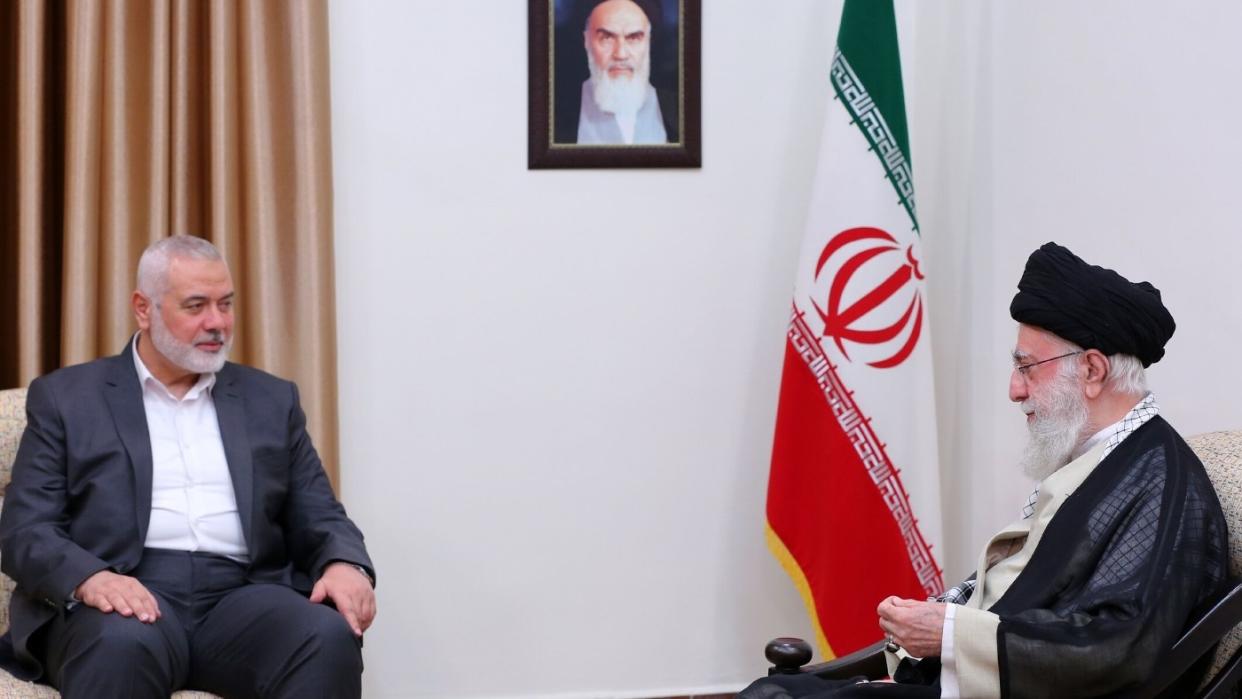Is Iran turning its back on Hamas?

- Oops!Something went wrong.Please try again later.
- Oops!Something went wrong.Please try again later.
Iran has told the US that it does not want the Israel-Hamas war to spread further, just days after its supreme leader told Hamas that his country would not enter the conflict.
The twin developments have called into question Iran's ongoing support for the Palestinian militant group. Analysts also say that there are "diplomatic opportunities" for Tehran in the wider Middle East as a result of the war, said the Financial Times.
What the papers said
Although Iran is the "main supporter of anti-Israel Islamist militants in the region", such as Hamas and Hezbollah, it has said it was not informed in advance of Hamas's 7 October attack, noted the FT, "a position that US officials have confirmed".
Iran will not "directly intervene" in the conflict unless it is itself attacked by Israel or the US, six officials told The Telegraph. But it will continue using its "axis network of armed allies" to launch rocket and drone attacks on Israeli and American targets.
This is a "calibrated effort to demonstrate solidarity for Hamas" and "stretch Israeli forces" without becoming engaged in a direct confrontation with Israel that could draw in the US.
Instead, Tehran is looking beyond Gaza, as the war has already created "diplomatic opportunities" for the country, said the FT, helping to "lessen its political isolation abroad". The Islamic republic has "seized the moment to narrow the gap with Arab and regional leaders", it added.
This means that Tehran could turn its back on Hamas, as the "fall" of the militant regime in Gaza "wouldn't harm Iran's regional strategy", agreed Haaretz.
In a face-to-face meeting in Tehran in early November, Iran’s supreme leader, Ayatollah Ali Khamenei, told the head of Hamas, Ismail Haniyeh, to silence those voices in the Palestinian group publicly calling for Iran and its powerful Lebanese ally Hezbollah to fully join the battle against Israel.
What next?
Despite Iran not getting involved directly, it has enjoyed benefits from the fighting. It has used the conflict to "sew more chaos in the region", said The Economist, and the war has "halted" diplomatic efforts to normalise relations between Israel and Saudi Arabia, Iran's "arch-rival".
There could be further benefits to come. Should the fighting "spread beyond Gaza, a surge in oil prices would fill Iran's coffers". So although a "full-blown war" that draws in America would be "catastrophic for the entire region", we should "not expect" Iran to "play peacemaker".
Meanwhile, the commander of Iran's Quds Force said the "resistance front" of which it is part supported Hamas in its war with Israel in Gaza, reported Reuters. The Quds Force is the arm of Iran's powerful Revolutionary Guards Corps that controls its allied militia groups in the region.
"Your brothers in the Axis of Resistance stand united with you," said Esmail Qaani, "…the resistance will not allow the enemy to achieve its dirty goals in Gaza and Palestine".
The likeliest route to full-blown war would be through a full intervention from Hezbollah, but a security official in Lebanon told The Times of Israel that Hezbollah is not interested in a wider war with Israel.
Abbas Ibrahim, a former head of Lebanon's General Security, said that as long as Hamas is able to confront the Israeli military in Gaza, "the situation will remain at the current level of tension" on the Lebanese front.
Israel has launched strikes on Hezbollah-linked sites in Lebanon in response to an anti-tank missile that was fired towards northern Israel on Wednesday.
Ibrahim conceded that the situation could escalate inadvertently, because “if we continue with this degree of tension it will certainly lead to bad calculations and a war will happen".

